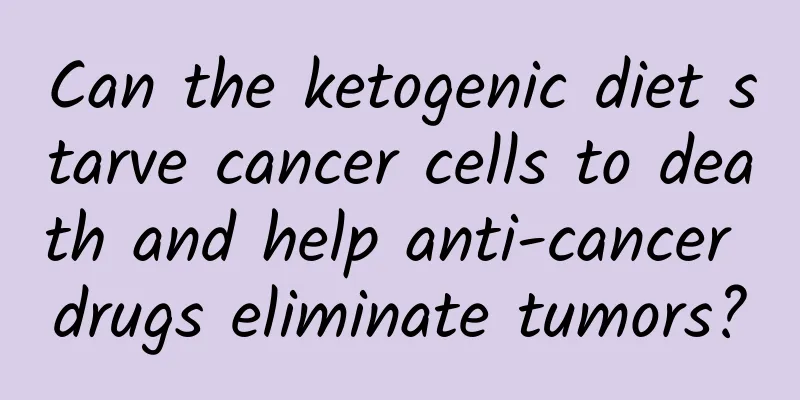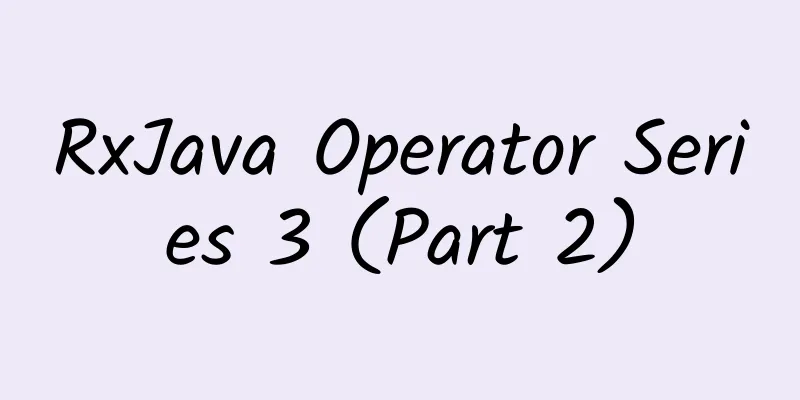Can the ketogenic diet starve cancer cells to death and help anti-cancer drugs eliminate tumors?

|
gossip "The ketogenic diet can starve cancer cells to death, helping anti-cancer drugs to eliminate tumors!" New research shows that the ketogenic diet can not only help you lose weight, but also starve cancer cells to death and prevent tumor growth. Let's try it now! In recent years, the ketogenic diet has been highly sought after by people and is almost one of the hottest weight loss methods. It is not only popular among the people, but also recommended by many nutritionists and professionals. Many celebrities are also using the ketogenic diet to lose weight. In addition to weight loss, the Internet recently said that the latest research found that the ketogenic diet can starve cancer cells and remove tumors in the body. What is the ketogenic diet? Can it really starve cancer cells? Is the ketogenic diet recommended? Rumor Analysis This statement is not accurate. The ketogenic diet cannot starve cancer cells to death, nor can it help anti-cancer drugs eliminate tumors. In addition, many ketogenic diets on the Internet are not the same as the ketogenic diets recommended by doctors. Blindly following the trend may bring more health risks. What is ketosis? The three main sources of energy in our body are carbohydrates (sugar), fats, and proteins. Under normal circumstances, our body will prioritize carbohydrates for energy, followed by fats, and finally proteins. After carbohydrates (sugars) provide us with energy, they will only turn into carbon dioxide and water, and will not produce any toxic or harmful components in the body. It can be said to be a very clean energy source. However, due to our poor ability to store sugar in our bodies, if we do not eat, the sugar reserves stored in the muscles and liver will soon be consumed. After consumption, the human body will first use protein and then consume fat to provide energy. If carbohydrates are a clean energy source, then fat is a much less clean energy source. Because fat has the structure of fatty acids, it will produce a lot of acidic residues - ketones (ketone bodies) when it provides energy to the human body, and the process of consuming fat to generate energy and ketone bodies at the same time is called "ketosis". Therefore, we can simply understand ketosis as "digesting fat." Copyrighted stock images, no reproduction is authorized What is the Ketogenic Diet? Ketogenic diet actually relies mainly on fat to provide energy, so the ketogenic diet is a relatively extreme low-carbohydrate diet. Its approach is to make your three meals a day almost without staple food, so that this diet will not provide energy mainly with carbohydrates, but with fat and protein, which will inevitably produce a lot of ketone bodies. The earliest popularity of the ketogenic diet can be traced back to the 1920s. At that time, there were no effective anti-epileptic drugs. As a method of treating epilepsy, the patient's carbon water intake was strictly restricted to simulate the body's hunger state. Therefore, the basic requirements of the ketogenic diet are low carbon water, high fat, and medium protein. Specifically, it is 70%~80% fat + 10%~20% protein 5%~10% carbohydrates, while controlling the total daily calorie intake to about 2000 kcal. Copyrighted stock images, no reproduction is authorized Can the ketogenic diet starve cancer cells to death and help anti-cancer drugs eliminate tumors? Various reports can often be seen online saying that the latest research has found that the ketogenic diet can starve cancer cells and help drugs clear tumors. This study does exist. It is a research paper from the University of California, San Francisco in August 2024. In a pancreatic cancer mouse model, researchers combined an anticancer drug called eFT508 with a ketogenic diet and found that this could block the only energy source (fat metabolism) of pancreatic cancer cells. As a result, a large number of media reported that they could "starve cancer cells to death." Under ketogenic diet conditions, free fatty acids activate the AMPK-MNK-eIF4E pathway, which in turn regulates the translation level of specific cell genes. Next, the research team used an anticancer drug called eFT508 (also called tomivosertib) in clinical trials to treat pancreatic cancer, which inactivates eIF4E and prevents pancreatic tumor growth. Because pancreatic tumors can grow under the action of fat, and eIF4E is more active when fat is burned, the research team put these mice on a ketogenic diet, forcing the tumor to consume only fat, and then gave them the anticancer drug eFT508. The results showed that eFT508 cut off the only energy source (fat metabolism) of pancreatic cancer cells, and the tumors also shrank. So, can the ketogenic diet really starve cancer cells to death? In fact, this statement is a typical title party statement, which is a distortion and misinterpretation of the original study. First of all, this study is only an animal study. From the perspective of research application, it has just begun and there is still a long way to go before future clinical applications. In fact, the scientists who led this study developed the drug eFT508 as early as the 2010s. More than a decade later, it is still in Phase II clinical trials, used as a monotherapy or in combination with checkpoint inhibitors. These trials are evaluating its safety, tolerability, anti-tumor activity and pharmacokinetic properties in the treatment of various types of cancer. There is no sign of its approval for application. Secondly, the focus of this study is not the ketogenic diet itself. The researchers' recent study is to explore whether different combinations of drugs and diets have different therapeutic effects. The mice in the experiment will continue to take drugs, not just a ketogenic diet. In general, this research is a good exploration of anti-cancer drugs and cancer treatments, but don’t simply assume that the ketogenic diet can starve cancer cells, treat cancer, or eliminate tumors. Copyrighted stock images, no reproduction is authorized Ketogenic diet is also harmful to health Many people would say that the ketogenic diet is recommended by many doctors and must be very healthy. In fact, many ketogenic diets on the Internet are not the same as the ketogenic diet used by doctors. When the ketogenic diet is used for clinical treatment, the dietary requirements are very strict. It not only requires that more than 70% of the energy required by the practitioner every day comes from fat, but also further requires that the energy supply ratio of fat and protein (referring to the calories provided by a certain nutrient to the body, accounting for the percentage of total calories consumed) be controlled at 4:1 or 3:1, and the calories from carbohydrate sources must be strictly controlled below 5% or the intake is less than 20 grams. This means that a large apple may cause the amount of carbohydrates to exceed the standard for that day. In fact, the clinical ketogenic diet needs to be carried out under the joint supervision of doctors and nutritionists. On the one hand, it is necessary to supervise the patient's body to be in a "ketogenic" state and monitor possible risks for timely treatment. On the other hand, it is because such an extreme diet pattern is difficult to stick to for a long time. Now the ketogenic diet method on the Internet basically only restricts carbohydrates or even does not eat carbon water. Other nutrients are not well controlled, and there is no guidance from doctors or nutritionists, which can easily cause harm to health. According to current research, the health hazards of the ketogenic diet include: 1. Increase the burden on the kidneys Excess ketone bodies in the human body must be excreted through the kidneys, so for people with kidney disease, it is absolutely forbidden to adopt a ketogenic diet, otherwise it may accelerate the development of kidney disease. For people without kidney disease, long-term high ketone bodies will also increase the burden on the kidneys, thereby increasing the risk of kidney stones. 2. Ketoacidosis is likely to occur Ketone bodies are a slightly acidic substance. Under normal circumstances, the amount in the body is very small. However, if the ketogenic diet is adopted for a long time, the ketone bodies accumulate to a certain level, and the blood may become acidic, resulting in ketoacidosis. 3. Severe rebound after normal diet For those who have successfully lost weight through ketosis, if they start to eat normally, they will find that they quickly gain weight back, and are even fatter than before losing weight. This is because the normal metabolic balance is broken due to rapid weight loss in a short period of time, and it is easy to rebound in retaliation. 4. Cause malnutrition Refusing carbohydrate foods will inevitably lead to the risk of unbalanced diet and micronutrient deficiency. If this trend is not corrected in a timely manner over a long period of time, serious health problems will occur. 5. Increase the risk of multiple chronic diseases In 2021, researchers from the American Institute of Physicians for Responsible Care, New York University, the University of Pennsylvania, George Washington University, and Bellevue Hospital in New York evaluated the ketogenic diet and concluded that the ketogenic diet may cause long-term damage to health and that a high-fat diet increases the risk of a variety of diseases, including heart disease, cancer, diabetes, and Alzheimer's disease. Copyrighted stock images, no reproduction is authorized Should I adopt a ketogenic diet? Many people believe in the ketogenic diet for weight loss, but it is not recommended for everyone to adopt the ketogenic diet for a long time. First of all, from the current research, the ketogenic diet can still achieve the effect of weight loss in the short term. However, in the long run, there is no significant difference between the effect of the ketogenic diet and other diets on body weight. Secondly, completely avoiding carbohydrates and following a long-term ketogenic diet will harm your health. In fact, consuming too little carbohydrates is not a healthy diet in itself and is also harmful to health. Studies have found that carbohydrate intake and mortality show a "U-shaped" relationship. Eating too much or too little will significantly increase mortality. The carbohydrate intake with the lowest mortality rate is 50%~55% of total energy intake. The "Balanced Diet Pagoda for Chinese Residents (2022)" also believes that cereals are an important feature of a balanced diet, and the most basic "base" of the dietary pagoda is also various cereal and potato foods. Current scientific research also believes that the energy provided by carbohydrates in a normal person's diet should account for 50% to 65% of the total energy. Cereals and potatoes are the main source of dietary energy and a good source of a variety of micronutrients and dietary fiber. Cereals include wheat, rice, corn, sorghum, etc. and their products, such as rice, steamed buns, pancakes, bread, biscuits, oatmeal, etc. It is recommended that adults consume 200g to 300g of cereals per day, including 50g to 150g of whole grains and miscellaneous beans; in addition, 50g to 100g of potatoes, from an energy perspective, is equivalent to 15g to 35g of rice. In general, blindly adopting a ketogenic diet may cause health damage to the body, and it is recommended that everyone should not blindly follow the trend. Looking in the mirror of rumors Fighting cancer and losing weight are pain points for many people. Coupled with the so-called "new research", many people who do not know the truth become more convinced of this. But in the pursuit of health, science and rationality are our true compasses. New research is certainly exciting, but many new studies have limited research samples, strict setting conditions, and may also contain a lot of uncertainty, so usually, it is best for us to regard it as "hope" and "good expectations" and not to be too blindly convinced. References [1] Paoli,A., Rubini, A., Volek, JS, & Grimaldi, KA (2013). Beyond weight loss: A review of the therapeutic uses of very-low-carbohydrate (ketogenic) diets.European Journal of Clinical Nutrition, 67(8), 789-796.doi:10.1038/ejcn.2013.116 ↑ [2] Yang, H., Zingaro, VA, Lincoff, J. et al. Remodelling of the translatome controls diet and its impact on tumorigenesis. Nature 633, 189–197 (2024). https://doi.org/10.1038/s41586-024-07781-7 ↑ [3] Hu T, Mills KT, Yao L, Demanelis K, Eloustaz M, Yancy Jr WS,Kelly TN, He J, Bazzano LA. Effects of low-carbohydrate diets versus low-fatdiets on metabolic risk factors: a meta-analysis of randomized controlled clinical trials. Am J Epidemiol. 2012 Oct 1;176(suppl_7):S44-54. ↑ [4] Li Guanzhen. Risks of low-carbohydrate diet for weight loss [A]. Proceedings of the 13th National Nutrition Science Conference of the Chinese Nutrition Society and the Global Chinese Nutrition Scientists Conference [C]. 2017: ↑ [5] Crosby L, Davis B, Joshi S, Jardine M, Paul J, Neola M, Barnard ND. Ketogenic Diets and Chronic Disease: Weighing the Benefits Against the Risks. Front Nutr. 2021 Jul 16;8:702802. doi: 10.3389/fnut.2021.702802. PMID: 34336911; PMCID: PMC8322232. ↑ [6] Sara B Seidelmann, et al. Dietary carbohydrate intake and mortality: a prospective cohort study and meta-analysis. DOI: https://doi.org/10.1016/S2468-2667(18)30135-X ↑ [7] Dietary Guidelines for Chinese Residents 2022. ↑ Author: Ruan Guangfeng, Deputy Director of Kexin Food and Health Information Exchange Center Review|Zhang Yu, researcher/PhD, Chinese Center for Disease Control and Prevention, national health science expert |
<<: Learning this method can save lives at critical moments! Today I will teach you step by step
>>: Do cats really think they are liquid? They can get into anything.
Recommend
Plague warning! Catching pikas and touching groundhogs, is that a risk to your life?
Summer vacation is here, and more people are trav...
6 excellent copywriting strategies to teach you how to write sharp copy!
"One good copy is worth 100 sales experts.&q...
After Apple and Samsung's high-end phones were "cold"
The recent financial reports of Apple and Samsung...
How to warm up for event operation and promotion?
A complete event includes four links: preliminary...
Recommended by experts: Must-read books for iOS development
Some iOS development books I recommend Last time ...
How to create exclusive brand day operation activities?
How to design a good operation plan ? It is essen...
Where is the "food" for super-hard "nuclear" technology? Travel all over the mountains and rivers to add "uranium" to China!
▲Cover figure of "Scientific Chinese": ...
Creative inventory of 7 major mainstream industries, all cases of information flow CTR8% are here!
I guess many optimizers have suffered from creati...
"Chang'e Stone"! Chinese scientists discovered a new mineral on the moon for the first time!
On September 9, the eve of the traditional Chines...
Researching new materials with AI is fast
Chen Sijin With the rapid development of artifici...
Moles can also become cancerous! Check out if your mole is dangerous →
Everyone has some moles on their body. Most moles...
China Automobile Dealers Association: China Automobile Retention Value Report in June 2023
Recently, the China Automobile Dealers Associatio...
Baidu bidding: It only costs 2400 to open an account with Baidu!
If you want to save your later advertising costs,...
What should we pay attention to when developing and registering mini programs?
For individual developers 1. Make page navigation...









